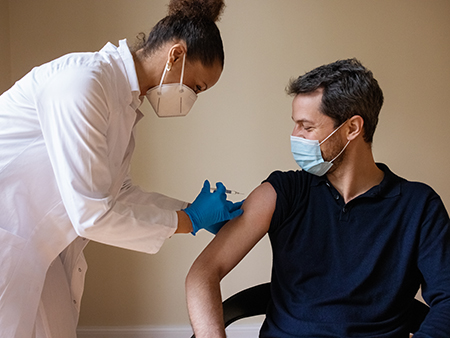Editor's Note: The information published in this story is accurate at the time of publication. Always refer to uab.edu/uabunited for UAB's current guidelines and recommendations relating to COVID-19.
 UAB’s Adam Baumgarten, M.D., shares more on the safety of the COVID-19 vaccine for men.As public health officials continue to urge the importance of receiving the COVID-19 vaccine, many continue to be hesitant, claiming that long-term effects are unknown. Much has been reported on the safety and efficacy of the vaccines for women who are pregnant or are trying to become pregnant, but what about men’s reproductive health?
UAB’s Adam Baumgarten, M.D., shares more on the safety of the COVID-19 vaccine for men.As public health officials continue to urge the importance of receiving the COVID-19 vaccine, many continue to be hesitant, claiming that long-term effects are unknown. Much has been reported on the safety and efficacy of the vaccines for women who are pregnant or are trying to become pregnant, but what about men’s reproductive health?
Adam Baumgarten, M.D., MBA, an assistant professor with the University of Alabama at Birmingham’s Department of Urology, says there is no evidence that the COVID-19 vaccine harms the male reproductive system.
“Studies have shown no changes in sperm parameters when comparing patients before and after two doses of the COVID vaccine,” Baumgarten said.
He also adds there are no reported side effects of the vaccine that impact male genitalia. Baumgarten says some of his patients typically ask if the COVID vaccine will give a person erectile dysfunction or make them infertile.
The short answer is no.
 Adam Baumgarten, M.D., MBA“Unfortunately, these myths are all over the internet,” Baumgarten said. “People come in with a predisposition that these are truth.”
Adam Baumgarten, M.D., MBA“Unfortunately, these myths are all over the internet,” Baumgarten said. “People come in with a predisposition that these are truth.”
However, there is evidence to support that COVID-19 infections can cause issues, he says, and the risks of being vaccinated pale in comparison to contracting COVID-19.
“Although it does not happen in a majority of patients, COVID infections can cause severe erectile dysfunction and decreasing sperm parameters, which can lead to infertility,” he said. “Studies have shown COVID virus present in the testicles up to three months after COVID symptoms cleared and in penile tissue up to nine months after COVID symptoms cleared.”
In Alabama, as of Sept. 14, 42.9 percent of males have received the COVID-19 vaccine, according to the Alabama Department of Public Health’s COVID-19 vaccine dashboard.
Schedule your free vaccine at uabmedicinevaccine.org.